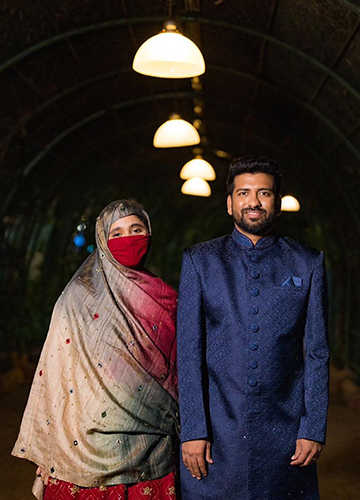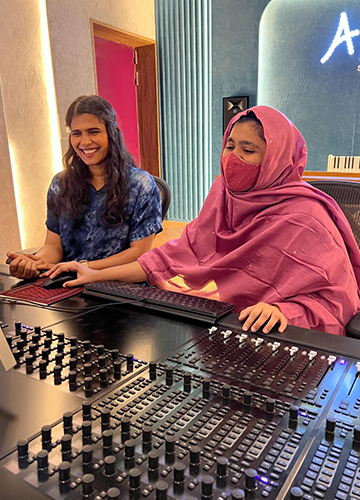It cannot be easy being Khatija Rahman―with all the comparisons with her father, the legendary A.R. Rahman, and the weight of expectation threatening to keel her over. Yet, Khatija’s spine is straight and her sight is fixed. Like her father, music for her too is oxygen, but the comparisons end there. Khatija believes in her own creative spirit and wants to stay independent. “I want my own music to speak,” she says. With her debut as a composer in Halitha Shameem’s Minmini, which released last month, Khatija has proved that her music cannot just speak, it can also beguile. Her compositions in Minmini do not resemble her father’s; there is a softness and silkiness to them. As composer, Khatija has arrived.
Clad in a red salwar, with a mask and a veil partially covering her face, it almost looks like Khatija hides behind her music. Yet, when she walks into THE WEEK’s office in Chennai, there is a spring in her step and a smile in her voice, as she tells us about how her style veers from her father’s, about her love for Lata Mangeshkar’s music, and about her own rise to fame as a singer.
Her tryst with music began when she was in the fourth standard, under her music teacher Gomathi who would come daily to teach the children. Slowly, she shifted from Carnatic to Hindustani classical music, which she says, “are almost the same”. Her debut as singer was at the age of 14, for ‘Puthiya Manitha’―the super-hit title track composed by Rahman in Shankar’s Enthiran, starring Rajinikath. One day, Rahman asked her to come to his studio for a rough recording of the song. But Khatija refused, citing her studies. She did not realise what singing a Rahman song meant for any singer. The next day, when her mother asked her to go, she did, missing her English cycle test in school. That disturbed her more than the appreciation she got for the song. “It was only a rough recording,” she says. “I never knew that my voice would be used in the final version as well.” She sang alongside S.P. Balasubrahmanyam and Rahman. Later, when the song did well, she recorded in Hindi and Telugu as well.
After the success of her first song, Khatija took a break from singing, choosing to focus on learning music instead. From Carnatic and Hindustani, she moved to western classical. “I continue to learn even today,” she says. “Music is always healing, empowering, spiritual and stirs so many emotions.”
Khatija’s style of work is largely influenced by the work she did with composers like Ricky Kej, Hesham Abdul Wahab, Sami Yusuf and Sterlin Nithya. Her single ‘Vizhigal Seraa’ in the Malayalam film Philip’s (2023), with background score by Wahab, is a breezy melody. With Grammy-winning Kej, it was a song on air pollution in September 2020. She also collaborated with the band U2 for the song ‘Ahimsa’, along with her sister Raheema and Rahman. Raised in a multicultural society, Khatija slips easily between different genres of music. An enduring love is of Mangeshkar’s voice. In fact, Khatija’s debut album, Kuhu Kuhu, released in 2023 on Mangeshkar’s 94th birth anniversary, was a tribute to the legend and consisted of five of her classic songs. The album was in collaboration with the Dubai-based Firdaus Orchestra, an all-woman 50-piece orchestra mentored by Rahman. Another album, Farishton (2020), with music composed by her father, was born out of her love for K. Asif’s magnum opus, Mughal-e-Azam (1960), which she watched at the age of 15 on the advice of her music teacher. She was awestruck by composer Naushad’s trailblazing tunes. There is something wistful about her voice in Farishton, as though it is the portal to a fairytale world. Somewhere in-between, it develops a personality of its own; it lulls, soothes and beckons. She transports you because she herself is transported.
And then in 2023 came her super-hit song with rapper Arivu, ‘Sagavaasi’, from Coke Studio’s first Tamil edition. “It was overwhelming, as it was the first time I recorded in another studio,” says Khatija. Her soulful rendition of ‘Chinnanjiru Nilave’ in Mani Ratnam’s Ponniyin Selvan 2 further catapulted her into the limelight. Now, she is all set to make her international debut as composer with Lioness, written and directed by Kajri Babbar.
Minmini happened when Khatija messaged Shameem to tell her how much she enjoyed her last film Sillu Karuppatti (2019). Then in 2022, Shameem asked her if she wanted to compose for Minmini. Although initially reluctant as she felt she was not ready, she later agreed. “[The film] has resonated very well in the minds of people,” says Khatija. “I am happy. I was really connected with the story.” ‘Iru Perum Nadhigal’―one of the most popular songs in the film―became an earworm for many. Together with Shameem’s visuals and Manoj Paramahamsa’s cinematography, the song is pure alchemy. “Halitha showed the visuals and we had to crack a tune,” says Khatija. “She did the lyrics instantly. I could never imagine anyone other than Sakthisree [Gopalan] singing it.” As the hero and heroine ride their bikes up a high mountain, the song refracts into sensations. “The euphonious singer is a brilliant music composer, too,” Shameem tweeted as she began working with Khatija.
Be it in crafting her music, her image, or her appearance, Khatija has remained fiercely independent, unswayed by the prevalent norms. Once, when author Taslima Nasrin commented on her burqa, Khatija responded by asking her to google the true meaning of feminism. When trolls on social media took up the same refrain, she chose to reply in her father’s style. “Please get some fresh air, cause I don’t feel suffocated,” she stated on social media. “Rather I am proud and empowered for what I stand for.” Just like her father, her faith finds expression in her love for Sufi music, which she says, gives her a sense of connection and ecstasy. The basic thing, she says, is to love everyone. What is the point of calling yourself religious if you are hurting people or breaking hearts? Religion is not about following rituals or traditions; it is about being a good human being. And it is this that she taps into when she composes music. Good music, for her, is the soul rising to meet its maker.




